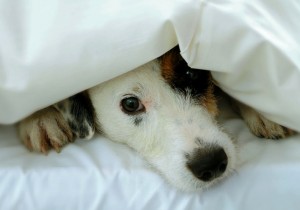News
Fireworks – How can you help?
by on October 12th, 2012
Category: News, Tags:
 Firework stress affects almost 50% of dogs and many cats too. Fireworks are no longer a 5th November only event and are heard throughout the autumn and often used for many other celebrations such as birthdays, weddings, New Year & Diwali.
Firework stress affects almost 50% of dogs and many cats too. Fireworks are no longer a 5th November only event and are heard throughout the autumn and often used for many other celebrations such as birthdays, weddings, New Year & Diwali.
Stress can manifest itself in many ways – some dogs will run around and vocalise; others even become destructive and may harm themselves.
However, sometimes the signs of stress can be much more subtle. This is especially true for cats and they will often withdraw and hide, meaning that their stress is not easily recognised.
The most important change that must be made is for you to change your behaviour. It is completely natural to want to reassure your pet when it is stressed however all this does is reinforce the unwanted behaviour and unfortunately makes matters worse.
If stress associated with fireworks is not dealt with, it often progresses to fear of other sounds like thunder and gunshots and eventually even every day noises such as car doors slamming. As a result we must address this problem promptly and effectively to improve the welfare of our pets.
Managing firework stress needs an approach to both the short and long-term issue. In the short term we must manage our pets on the night. Long term we need to change the feelings our pets associate with fireworks in order that they do not become stressed.
Short Term Management
Here are some useful tips to help your pet cope during the firework season:
- Provide a den or hiding place and ideally where your pet would normally seek refuge
- Muffle the sound of the fireworks and radio, television, close the curtains
- Keep your pet inside and close the cat flap and ensure you dog is not able to access the garden
- Do not fuss them, or tell them off, if they are stressed
- Reward quiet, calm behaviour
- Consider anxiety relieving products such as Adaptil, Feliway, Zylkene and KalmAid. There are no known side effects with these products such as sedation or memory loss. They can be used for both short and long-term management.
Long Term Management
Sound desensitisation is proven to address the underlying problem by altering your pet’s reaction to the stress-inducing noises. It works by exposing your pet to the scary sounds under controlled conditions whilst it is doing something enjoyable such as chewing a favourite toy or treat. This then breaks the negative association that your pet has learned with respect to fireworks and makes the association more positive.
The most common method uses CD’s which are played initially for a very short amount of time at low volume. The length of time and volume is gradually increased as your pet progresses through the programme.
Sound Desensitisation takes time (usually weeks to months) and you must be guided by your pet as to how quickly you can progress.
How do anxiety-relieving products help?
Zylkene is a novel natural product derived from milk protein, which has relaxing properties, and is proven to help manage stress in cats and dogs.
KalmAid contains L-Tryptophan which is an essential amino acid that affects production of serotonin. Serotonin has a calming and relaxing effect. L-theanine, another amino acid also has a calming effect. Vitamin B1 is added as deficiency has been associated with nervous disorders.
Feliway is a synthetic copy of the natural feline facial pheromone, and creates a state of familiarity and security in the cat’s local environment.
Adaptil is a copy of a naturally released dog ‘appeasing pheromone’ that has a comforting and reassuring influence.
Please make an appointment to discuss your pet’s specific needs with us.
You can leave a response, or trackback from your own site.
